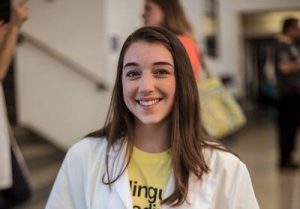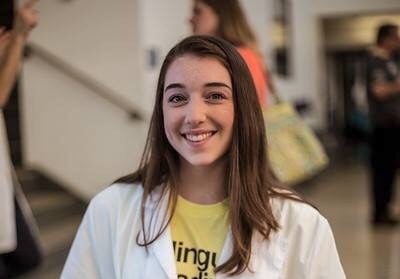Interview with NSF GRFP Fellow Carolyn Gershman
Carolyn Gershman is a Ph.D. candidate in Georgetown’s Interdisciplinary Program in Neuroscience. The Office of Graduate Fellowships & Awards spoke with Carolyn about her work in the field and her experience as a recent recipient of the National Science Foundation (NSF) Graduate Research Fellowship Program (GRFP).

What is your research focus?
I have been very interested in the relationship between language and cognition, specifically sign languages. More recently, that interest has been expanded more broadly to include how language experience, language modality, injury, or trauma may impact the structure and function of language and other aspects of cognition.
How did you learn about the NSF Graduate Research Fellowship?
I learned about the NSF GRFP as an undergraduate at the University of Rochester, through the fellowship office there. I almost applied my senior year but ended up deciding to wait until I had more time and could flesh out my proposal a bit more.
What made you decide to apply?
I had become really invested in this small gap in the sign language working memory field as an undergraduate, and I had written a paper on it my senior year. When I learned about the NSF, it seemed like a good opportunity to learn how to translate a research idea into a grant, so I decided to apply. Additionally, my program – the IPN – really encourages anyone eligible to apply in the first or second year, so I had a lot of support and encouragement from them, too.
How do you hope the NSF Graduate Research Fellowship will positively impact your studies or future career?
The NSF GRFP has first and foremost given me a little boost of confidence — Imposter syndrome is real, but having my work recognized by NSF as an important topic and as something worth pursuing was a really meaningful moment for me. I think that the process of applying to NSF has taught me a lot about writing proposals and grants, which I hope will serve me well moving forward in academia. Lastly, the funding through this fellowship will really allow me to explore my specific interests more — I will have opportunities that I may not have otherwise had, like my own scanner time and attending conferences and workshops, which I hope will help my development as a student and researcher in this field.
What’s one piece of advice you would give to prospective applicants?
The most important piece of advice I can think of is probably to make sure your research proposal is a topic that you really care about. It sounds sort of obvious, but it gave me a lot of motivation while writing my application and made the whole process really enjoyable. Also, I think that reviewers appreciate the human-side to the research, too — who you are as a person, what is meaningful to you, etc., so writing about a population so important to me helped me integrate the research and personal aspects and express my personality in the application a bit.
